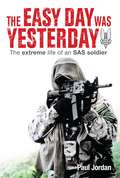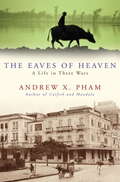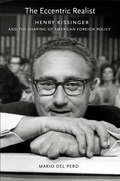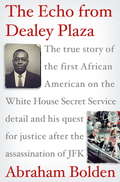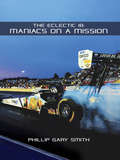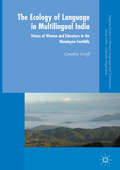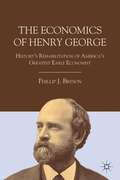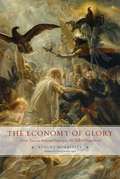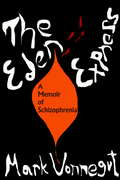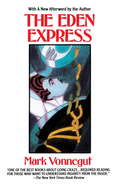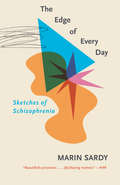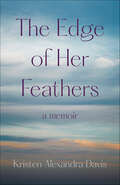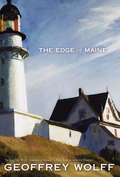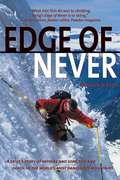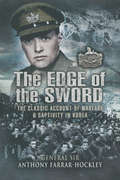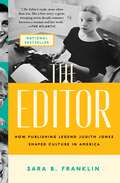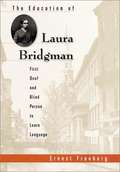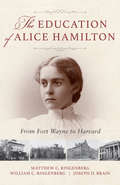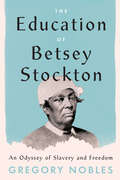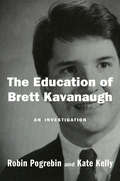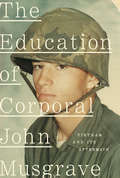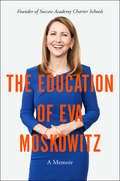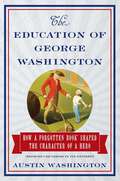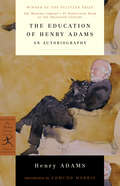- Table View
- List View
The Easy Day Was Yesterday: The Extreme Life of an SAS Soldier (Big Sky Publishing Ser.)
by Paul JordanFrom his cage in a putrid, overcrowded Indian gaol, Paul Jordan reflects on a life lived on the edge and curses the miscalculation that robbed him of his freedom. His childhood, marred by the loss of his father and brother, produce a young man hell bent on being the best of the best - an ambition he achieves by being selected to join the elite SAS. He survives the gut-wrenching training regime, deployment to the jungles of Asia and the horrors of genocide in Rwanda before leaving the army to embark on a career as a security adviser. His new life sees him pursuing criminals and gun-toting bandits in Papua New Guinea and the Solomons, protecting CNN newsmen as the US 7th Cavalry storms into Baghdad with the outbreak of the Iraq War, and facing death on a massive scale as he accompanies reporters into the devastated Indonesian town of Banda Aceh, flattened by the Boxing Day tsunami. During his 24 days in an Indian gaol, Paul Jordan discovers that friendship and human dignity somehow survive the filth and deprivation. This is a personal account of a tough, hardened fighter who suddenly finds himself totally dependent on others for his every need. The Easy Day was Yesterday is fast paced, brutally honest and raw, but laced with dark humour. The core of Paul Jordan's eventful life, however, is the strength of his bonds with family and friends and the ability of the human spirit to survive even the direst adversity.
The Eaves of Heaven
by Andrew X. PhamOne of the Ten Best Books of the Year, Washington Post Book World One of the Los Angeles Times’ Favorite Books of the Year One of the Top Ten National Books of 2008, Portland Oregonian A 2009 Honor Book of the Asian/Pacific American Librarians Association “Few books have combined the historical scope and the literary skill to give the foreign reader a sense of events from a Vietnamese perspective. . . . Now we can add Andrew Pham’s Eaves of Heaven to this list of indispensable books. ” —New York Times Book Review “Searing . . . vivid–and harrowing . . . Here is war and life through the eyes of a Vietnamese everyman. ” —Seattle Times Once wealthy landowners, Thong Van Pham’s family was shattered by the tumultuous events of the twentieth century: the French occupation of Indochina, the Japanese invasion during World War II, and the Vietnam War. Told in dazzling chapters that alternate between events in the past and those closer to the present,The Eaves of Heavenbrilliantly re-creates the trials of everyday life in Vietnam as endured by one man, from the fall of Hanoi and the collapse of French colonialism to the frenzied evacuation of Saigon. Pham offers a rare portal into a lost world as he chronicles Thong Van Pham’s heartbreaks, triumphs, and bizarre reversals of fortune, whether as a South Vietnamese soldier pinned down by enemy fire, a prisoner of the North Vietnamese under brutal interrogation, or a refugee desperately trying to escape Vietnam after the last American helicopter has abandoned Saigon. This is the story of a man caught in the maelstrom of twentieth-century politics, a gripping memoir told with the urgency of a wartime dispatch by a writer of surpassing talent.
The Eccentric Realist: Henry Kissinger and the Shaping of American Foreign Policy
by Mario Del PeroDuring the 2008 election season, the Democratic and Republican presidential candidates both aspired to be understood as foreign policy "realists" in the mold of Henry Kissinger. Kissinger, who is distrusted on the neoconservative right for his skepticism about American exceptionalism and on the liberal left for his amoral, realpolitik approach, once again stood as the sage of foreign relations and the wise man who rises above partisan politics. In The Eccentric Realist, Mario Del Pero questions this depiction of Kissinger. Lauded as the foreign policy realist par excellence, Kissinger, as Del Pero shows, has been far more ideological and inconsistent in his policy formulations than is commonly realized. Del Pero considers the rise and fall of Kissinger's foreign policy doctrine over the course of the 1970s-beginning with his role as National Security Advisor to Nixon and ending with the collapse of détente with the Soviet Union after Kissinger left the scene as Ford's outgoing Secretary of State. Del Pero shows that realism then (not unlike realism now) was as much a response to domestic politics as it was a cold, hard assessment of the facts of international relations. In the early 1970s, Americans were weary of ideological forays abroad; Kissinger provided them with a doctrine that translated that political weariness into foreign policy. Del Pero argues that Kissinger was keenly aware that realism could win elections and generate consensus. Moreover, over the course of the 1970s it became clear that realism, as practiced by Kissinger, was as rigid as the neoconservativism that came to replace it. In the end, the failure of the détente forged by the realists was not the defeat of cool reason at the hands of ideologically motivated and politically savvy neoconservatives. Rather, the force of American exceptionalism, the touchstone of the neocons, overcame Kissinger's political skills and ideological commitments. The fate of realism in the 1970s raises interesting questions regarding its prospects in the early years of the twenty-first century.
The Echo from Dealey Plaza
by Abraham BoldenA gripping and unforgettable true story of bravery and patriotism in the face of bitter hatred. Abraham Bolden was a young African American Secret Service agent in Chicago when he was asked by John F. Kennedy himself to join the White House Secret Service detail. For Bolden, it was a dream come true-and an encouraging sign of the charismatic president's vision for a new America. But the dream quickly turned sour. Bolden found himself regularly subjected to open hostility and blatant racism, and he was appalled by the White House team's irresponsible approach to security. In the wake of JFK's assassination, Bolden sought to expose the agency's negligence, only to find himself the victim of a sinister conspiracy. The Echo from Dealey Plazais the story of the terrible price paid by one man for his commitment to truth and justice.
The Eclectic 18: turbo articles, riveting reviews, inspiring life insights from unique books, movies, broadcasts, and race events critiqued in Radioactive Drag Racing News
by Phillip Gary SmithWhat’s it like to be a maniac on a mission? From the worlds of performance engineering, product development, drag racing, auto racing and human creativity, go beyond with THE ECLECTIC 18. Learn tipping points key to the success of The Justice Brothers oil empire uncovered only here. Realize lessons from Funny Car NHRA pioneer John Force’s rise to racing supremacy and how his success - and failures - may improve your life. Discover the “Top Ten Tommy Teachings,” shocking ways to survive absolute terminal cancer from one driven competitor. Absorb how a car known as Big Noise II dominated a man’s life and a tragedy. What about “My First Car” of yours; how does it stack up against Hugh Hefner’s, Steve McQueen’s, and many others you will know? Just try to be as big and creative in your thinking as “TV Tommy Ivo, Drag Racing’s Master Showman.” Take to heart a real maniac on a mission: “Mickey Thompson, the Fast Life and Tragic Death of a Racing Legend.” Use these readings for their lessons in life, then apply them. Joyfully “Dance the Western Swing,” “Light the Dark,” plus recognize what happens when one doubles down in Vegas with nitro chips. Understand the spectacle resulting “When 10000 Horsepower Goes Wrong.” With THE ECLECTIC 18 you, too, may just be one of “The New Kids on the Winner’s Block” of life. Find deeper meanings and helpful insights on striving to succeed and becoming relevant that also entertains. “THE ECLECTIC 18 traded the safety of emotional equilibrium for their compulsion to unabashedly collide with life’s vicissitudes with unrelenting verve.” Jeff Kildahl, Ph.D., Creator and President, The Wholistic Edge®
The Ecology of Language in Multilingual India: Voices of Women and Educators in the Himalayan Foothills (Palgrave Studies in Minority Languages and Communities)
by Cynthia GroffThis book explores the linguistic ecology of the Kumaun region of Uttarakhand, India through the experiences and discourses of minority youth and their educators. Providing in-depth examples of Indian multilingualism, this volume analyses how each language is valued in its own context; how national-level policies are appropriated and contested in local discourses; and how language and culture influence educational opportunities and identity negotiation for Kumauni young women. In doing so, the author examines how students and educators navigate a multilingual society with similarly diverse classroom practices. She simultaneously critiques the language and education system in modern India and highlights alternative perspectives on empowerment through the lens of a unique Gandhian educational context. This volume allows Kumauni women and their educators to take centre stage, and provides a thoughtful and nuanced insight into their minority language environment. This unique book is sure to appeal to students and scholars of multilingualism, sociolinguistics, language policy and minority languages.
The Economics of Henry George
by Phillip J. BrysonHenry George the greatest, most famous and most rejected of early American economists who trained himself in classical economics and developed a theory of a 'single tax'. There is much literature on many specific facets and aspects of George's work, but we lack a book which provides an overview of George's economics. . . until now!
The Economy of Glory: From Ancien Régime France to the Fall of Napoleon
by Robert Morrissey translated by Teresa Lavender FaganFrom the outset of NapoleonOCOs career, the charismatic Corsican was compared to mythic heroes of antiquity like Achilles, and even today he remains the apotheosis of French glory, a value deeply embedded in the countryOCOs history. From this angle, the Napoleonic era can be viewed as the final chapter in the battle of the Ancients and Moderns. In this book, Robert Morrissey presents a literary and cultural history of glory and its development in France and explores the OC economy of gloryOCO Napoleon sought to implement in an attempt to heal the divide between the Old Regime and the Revolution. aExamining how Napoleon saw glory as a means of escaping the impasse of Revolutionary ideas of radical egalitarianism, Morrissey illustrates the challenge the leader faced in reconciling the antagonistic values of virtue and self-interest, heroism and equality. He reveals that the economy of glory was both egalitarian, creating the possibility of an aristocracy based on merit rather than wealth, and traditional, being deeply embedded in the history of aristocratic chivalry and the monarchyOComaking it the heart of NapoleonOCOs politics of fusion. Going beyond Napoleon, Morrissey considers how figures of French romanticism such as Chateaubriand, Balzac, and Hugo constantly reevaluated this legacy of glory and its consequences for modernity. Available for the first time in English, "The Economy of Glory" is a sophisticated and beautifully written addition to French history. "
The Eden Express
by Mark Vonnegut Kurt VonnegutThe Eden Express describes from the inside Mark Vonnegut's experience in the late '60s and early '70s--a recent college grad; in love; living communally on a farm, with a famous and doting father, cherished dog, and prized jalopy--and then the nervous breakdowns in all their slow-motion intimacy, the taste of mortality and opportunity for humor they provided, and the grim despair they afforded as well. That he emerged to write this funny and true book and then moved on to find the meaningful life that for a while had seemed beyond reach is what ultimately happens in The Eden Express. But the real story here is that throughout his harrowing experience his sense of humor let him see the humanity of what he was going through, and his gift of language let him describe it in such a moving way that others could begin to imagine both its utter ordinariness as well as the madness we all share.
The Eden Express: A Memoir of Insanity
by Mark Vonnegut"Most diseases can be separated from one's self ... schizophrenia is something we are." So begins Mark Vonnegut's depiction of his descent into, and eventual emergence from, mental illness. As a recent college graduate, self-avowed hippie, and son of a counterculture hero, Vonnegut begins to experience increasingly delusional thinking, suicidal thoughts, and physical incapacity. In February 1971 he is committed to a psychiatric hospital. The Eden Express, an ALA Notable Book first published over 25 years ago, is his honest, thoughtful, and moving account of the illness of schizophrenia.
The Edge of Every Day: Sketches of Schizophrenia
by Marin SardyThe debut of an important new literary voice: Marin Sardy's extraordinarily affecting, fiercely intelligent memoir unflinchingly traces the path of the schizophrenia that runs in her family.Against the starkly beautiful backdrop of Anchorage, Alaska, where the author grew up, Marin Sardy weaves a fearless account of the shapeless thief—the schizophrenia—that kept her mother immersed in a world of private delusion and later manifested in her brother, ultimately claiming his life. Composed of exquisite, self-contained chapters that take us through three generations of this adventurous, artistic, and often haunted family, The Edge of Every Day draws in topics from neuroscience and evolution to the mythology and art rock to shape its brilliant inquiry into how the mind works. In the process, Sardy casts new light on the treatment of the mentally ill in our society. Through it all runs her blazing compassion and relentless curiosity, as her meditations takes us to the very edge of love and loss—and invite us to look at what comes after.
The Edge of Her Feathers: A Memoir
by Kristen Alexandra DavisShe dreams of driving across the bridges. She’d never been afraid before; but now, in the dreams, strange, magical happenings unfold. One night, at the Golden Gate, the span carries her underwater, where she discovers long lost friends, all sitting at a beautiful table at the bottom of the Bay; only it was long ago, and everyone is in Victorian dress.In another dream, the Bridge does not yet exist. Where the beautiful city would appear, there are only sandstone cliffs and desert; and she is just spirit, flying above the water.But in most of the dreams she is driving. Her eyelids become heavy, she can’t see the road. struggles desperately to keep control of the car, but can feel herself falling, slipping towards the floor, the car breaking over the railing, carrying her with it under the water. The dreams recur so often that she becomes afraid of heights, of driving over the railing into the waves. Then just as suddenly the dreams stop. Years pass, until the day she hears that he’s jumped, when they return.In this memoir we accompany the author on her search to unearth the magical and terrifying childhood she has all but buried.
The Edge of Maine
by Geoffrey WolffNow, with the voice of a passionate insider, he brings readers into the heart of this striking region and explains what makes it unique. Starting with a gripping tale about being lost offshore in the fog with inadequate navigational aids, Wolff goes on to describe the coast's geological history and discovery by Europeans. He then turns a keen eye towards Mainers, their mores and peculiarities, and to the summer rusticators who for generations have invaded the stunning waterfronts. A section on boat building celebrates the extraordinary rescue of Maine's foremost craft; another on lobsters tells the rich story of the custom, taste, commerce, environmental conflict, and scientific mystery surrounding these critical crustaceans. Here is a true feast--travel literature at its best.
The Edge of Never: A Skier's Story of Life, Death, and Dreams in the World's Most Dangerous Mountains
by William A. KerigIn the world of big-mountain skiing, Trevor Petersen was a legend. Appearing in countless films, magazines and photo shoots, his ponytail flying behind him, he was the very embodiment of the freewheeling spirit of extreme skiing in the 1980s and early '90s. Then it all came to an end. On February 26, 1996, while skiing in Chamonix, France - the so-called Death Sport Capital of the World - an avalanche swept Trevor away. His body was found sitting up in the snow as if gazing at the mountains he loved. Nearly a decade later, Trevor's fifteen-year-old son, Kye Petersen, a rising star in his own right, traveled to Chamonix to ski the run that took his father's life and, with the aid of some of the world's greatest ski mountaineers, to become a member of skiing's big-mountain tribe. There to chronicle Kye's story was William A. Kerig, a filmmaker with a dream of his own - to create a film about the soul of big-mountain skiing and the band of mountaineers who ski the steepest, wildest, most dangerous terrain in the world. In The Edge of Never, Kerig gives us not only a ripping adventure tale about a young man coming of age but a frank and subtle portrait of the extreme skiers who "live big" in the face of death and risk everything to experience the fullness of life in the mountains.
The Edge of the Sword: The Classic Account of Warfare & Captivity in Korea
by Anthony Farrar-HockleyAn account of the 1st Battalion, Gloucestershire Regiment, at the Battle of Imjin River during the Korean War and the survivors&’ captivity in a POW camp. In April 1951, at the height of the Korean War, Chinese troops advanced south of the 38th parallel towards a strategic crossing-point of the Imjin River on the invasion route to the South Korean capital of Seoul. The stand of the 1st Battalion, the Gloucestershire Regiment, against the overwhelming numbers of invading troops has since passed into British military history. In The Edge of the Sword General, Sir Anthony Farrar-Hockley, then Adjutant of the Glosters, has painted a vivid and accurate picture of the battle as seen by the officers and soldiers caught up in the middle of it. The book does not, however, end there. Like the majority of those who survived, the author became a prisoner-of-war, and the book continues with a remarkable account of his experiences in and out of Chinese prison camps. This book is not an attempt at a personal hero-story, and it is certainly not a piece of political propaganda. It is, above all, an amazing story of human fortitude and high adventure.
The Editor: How Publishing Legend Judith Jones Shaped Culture in America
by Sara B. FranklinLegendary editor Judith Jones, the woman behind some of the most important authors of the 20th century—including Julia Child, Anne Frank, Edna Lewis, John Updike, and Sylvia Plath—finally gets her due in this &“surprising, granular, luminous, and path-breaking biography&” (Edward Hirsch, author of How to Read a Poem).At Doubleday&’s Paris office in 1949, twenty-five-year-old Judith Jones spent most of her time wading through manuscripts in the slush pile and passing on projects—until one day, a book caught her eye. She read it in one sitting, then begged her boss to consider publishing it. A year later, Anne Frank: The Diary of a Young Girl became a bestseller. It was the start of a culture-defining career in publishing. During her more than fifty years as an editor at Alfred A. Knopf, Jones nurtured the careers of literary icons such as Sylvia Plath, Anne Tyler, and John Updike, and helped launched new genres and trends in literature. At the forefront of the cookbook revolution, she published the who&’s who of food writing: Edna Lewis, M.F.K. Fisher, Claudia Roden, Madhur Jaffrey, James Beard, and, most famously, Julia Child. Through her tenacious work behind the scenes, Jones helped turn these authors into household names, changing cultural mores and expectations along the way. Judith&’s work spanned decades of America&’s most dramatic cultural change—from the end of World War II through the civil rights movement and the fight for women&’s equality—and the books she published acted as tools of quiet resistance. Now, based on exclusive interviews, never-before-seen personal papers, and years of research, her astonishing career is explored for the first time in this &“thorough and humanizing portrait&” (Kirkus Reviews).
The Education Of Laura Bridgman: First Deaf And Blind Person To Learn Language
by Ernest FreebergIn the mid-nineteenth century, Laura Bridgman, a young child from New Hampshire, became one of the most famous women in the world. Philosophers, theologians, and educators hailed her as a miracle, and a vast public followed the intimate details of her life with rapt attention. This girl, all but forgotten today, was the first deaf and blind person ever to learn language. Laura's dark and silent life was transformed when she became the star pupil of the educational crusader Dr. Samuel Gridley Howe. Against the backdrop of an antebellum Boston seething with debates about human nature, programs of moral and educational reform, and battles between conservative and liberal Christians, Freeberg tells this extraordinary tale of mentor and student, scientist and experiment. Under Howe's constant tutelage, Laura voraciously absorbed the world around her, learning to communicate through finger language, as well as to write with confidence. Her remarkable breakthroughs vindicated Howe's faith in the power of education to overcome the most terrible of disabilities. In Howe's hands, Laura's education became an experiment that he hoped would prove his own controversial ideas about the body, mind, and soul. Poignant and hopeful, The Education of Laura Bridgman is both a success story of how a sightless and soundless girl gained contact with an ever-widening world, and also a cautionary tale about the way moral crusades and scientific progress can compromise each other. Anticipating the life of Helen Keller a half-century later, Laura's is a pioneering story of the journey from isolation to accomplishment, as well as a window onto what it means to be human under the most trying conditions.
The Education of Alice Hamilton: From Fort Wayne to Harvard
by William C. Ringenberg Matthew C. Ringenberg Joseph D. BrainA biography of Harvard’s first female faculty member—a pioneer in public health and worker safety.Born and raised in Fort Wayne, Indiana, Alice Hamilton graduated from medical school in 1893, and after completing internships at hospitals in Minneapolis and Boston, she rejected private practice and began dedicating herself to public health. Focusing on the investigation of the health and safety measures—or rather lack thereof—in the nation’s factories and mines during the second decade of the twentieth century, her discoveries led to factory and mine level-initiated reforms, and to city, state, and federal reform legislation. It also led to a greater recognition in the nation’s universities for formal academic programs in industrial and public health. In 1919, Harvard officials considered Hamilton the best-qualified person in the country to lead their effort in this area. The Education of Alice Hamilton is an inspiring story of a woman who lived a remarkable life at a time when women were not always welcome in medical circles—serving as personal physician to Jane Addams, founder of Hull House; traveling to the Soviet Union and Nazi Germany; researching the effects of mercury, carbon monoxide, benzene, and other substances on workers. She was sometimes ignored—such as when she warned of the dangers of lead in gasoline decades before it was eventually banned—but she persisted, and thanks in part to her groundbreaking work, Americans now enjoy the protection of OSHA, the Occupational Safety and Health Act.
The Education of Betsey Stockton: An Odyssey of Slavery and Freedom
by Gregory NoblesA perceptive and inspiring biography of an extraordinary woman born into slavery who, through grit and determination, became a historic social and educational leader. The life of Betsey Stockton (ca. 1798–1865) is a remarkable story of a Black woman’s journey from slavery to emancipation, from antebellum New Jersey to the Hawai‘ian Islands, and from her own self-education to a lifetime of teaching others—all told against the backdrop of the early United States’ pervasive racism. It’s a compelling chronicle of a critical time in American history and a testament to the courage and commitment of a woman whose persistence grew into a potent form of resistance. When Betsey Stockton was a child, she was “given, as a slave” to the household of Rev. Ashbel Green, a prominent pastor and later the president of what is now Princeton University. Although she never went to school, she devoured the books in Green’s library. After being emancipated, she used that education to benefit other people of color, first in Hawai‘i as a missionary, then Philadelphia, and, for the last three decades of her life, Princeton—a college town with a genteel veneer that never fully hid its racial hostility. Betsey Stockton became a revered figure in Princeton’s sizeable Black population, a founder of religious and educational institutions, and a leader engaged in the day-to-day business of building communities. In this first book-length telling of Betsey Stockton’s story, Gregory Nobles illuminates both a woman and her world, following her around the globe, and showing how a determined individual could challenge her society’s racial obstacles from the ground up. It’s at once a revealing lesson on the struggles of Stockton’s times and a fresh inspiration for our own.
The Education of Brett Kavanaugh: An Investigation
by Kate Kelly Robin Pogrebin<P><P>In September 2018, the F.B.I. was given only a week to investigate allegations of sexual misconduct against Brett Kavanaugh, President Trump's Supreme Court nominee. But even as Kavanaugh was sworn in to his lifetime position, many questions remained unanswered, leaving millions of Americans unsettled. <P><P>During the Senate confirmation hearings that preceded the bureau's brief probe, New York Times reporters Robin Pogrebin and Kate Kelly broke critical stories about Kavanaugh's past, including the "Renate Alumni" yearbook story. They were inundated with tips from former classmates, friends, and associates that couldn't be fully investigated before the confirmation process closed. <P><P>Now, their book fills in the blanks and explores the essential question: Who is Brett Kavanaugh? The Education of Brett Kavanaugh paints a picture of the prep-school and Ivy-League worlds that formed our newest Supreme Court Justice. <P><P>By offering commentary from key players from his confirmation process who haven't yet spoken publicly and pursuing lines of inquiry that were left hanging, it will be essential reading for anyone who wants to understand our political system and Kavanaugh's unexpectedly emblematic role in it.
The Education of Corporal John Musgrave: Vietnam and Its Aftermath
by John MusgraveA Marine's searing and intimate story—"A passionate, fascinating, and deeply humane memoir of both war and of the hard work of citizenship and healing in war&’s aftermath. A superb addition to our understanding of the Vietnam War, and of its lessons&” (Phil Klay, author of Redeployment).John Musgrave had a small-town midwestern childhood that embodied the idealized postwar America. Service, patriotism, faith, and civic pride were the values that guided his family and community, and like nearly all the boys he knew, Musgrave grew up looking forward to the day when he could enlist to serve his country as his father had done. There was no question in Musgrave&’s mind: He was going to join the legendary Marine Corps as soon as he was eligible. In February of 1966, at age seventeen, during his senior year in high school, and with the Vietnam War already raging, he walked down to the local recruiting station, signed up, and set off for three years that would permanently reshape his life.In this electrifying memoir, he renders his wartime experience with a powerful intimacy and immediacy: from the rude awakening of boot camp, to daily life in the Vietnam jungle, to a chest injury that very nearly killed him. Musgrave also vividly describes the difficulty of returning home to a society rife with antiwar sentiment, his own survivor's guilt, and the slow realization that he and his fellow veterans had been betrayed by the government they served. And he recounts how, ultimately, he found peace among his fellow veterans working to end the war. Musgrave writes honestly about his struggle to balance his deep love for the Marine Corps against his responsibility as a citizen to protect the very troops asked to protect America at all costs. Fiercely perceptive and candid, The Education of Corporal John Musgrave is one of the most powerful memoirs to emerge from the war.
The Education of Eva Moskowitz: A Memoir
by Eva S. MoskowitzFrom Eva Moskowitz, the outspoken founder and CEO of the charter school Success Academy, comes a frank, feisty memoir about the rough-and-tumble battles to reform America’s education system.Eva Moskowitz is a fighter with a reputation for having "sharp elbows"— if that’s a synonym for getting the job done, she’ll take it. A born and bred New Yorker, former City Councilmember, and "charter czarina," Moskowitz has taken on powerful unions and politicians to establish and grow her astonishingly effective and popular charter school program in four of the city’s five boroughs.In this unabashedly candid memoir, Moskowitz tells of how she became a forward-thinking education entrepreneur and her fight to establish nearly three dozen schools—activism that has made her into one of the most polarizing figures in New York City and beyond. Now, having established a remarkable, even unprecedented, track record for guiding the city’s most disadvantaged children to high academic performance, Moskowitz addresses the battles she has won and lost, writing candidly about the people who seek to undermine her work—most notably New York City Mayor Bill de Blasio—and celebrating the powerful allies who have aided her cause, including former Mayor Michael Bloomberg and Governor Andrew Cuomo.Moskowitz’s insightful memoir is a deeply felt personal story and an impassioned call to action that bluntly identifies failing policies and the alarmingly powerful forces arrayed against improving an education system that is both deeply dysfunctional and prejudiced. The Education of Eva Moskowitz is sure to galvanize supporters, enrage her opponents, generate headlines, and urgently impact the national conversation on education.
The Education of George Washington: How a forgotten book shaped the character of a hero
by Austin WashingtonGeorge Washington-a man of honor, bravery and leadership. He is known as America's first President, a great general, and a humble gentleman, but how did he become this man of stature? <P><P>The Education of George Washington answers this question with a new discovery about his past and the surprising book that shaped him. Who better to unearth them than George Washington's great-nephew, Austin Washington? <P><P>Most Washington fans have heard of "The Rules of Civility" and learned that this guided our first President. But that's not the book that truly made George Washington who he was. <P><P>In The Education of George Washington, Austin Washington reveals the secret that he discovered about Washington's past that explains his true model for conduct, honor, and leadership-an example that we could all use. <P><P>The Education of George Washington also includes a complete facsimile of the forgotten book that changed George Washington's life.
The Education of Henry Adams
by Henry AdamsA scion of the famous Adams family of American statesmen, historian Henry Adams crafted this well-known autobiographical work, which reflects his constant search for order in a world of chaos. He cast himself as a modern everyman, seeking coherence in a fragmented universe and concluding that his education was inadequate for the demands of modern society.<P><P> Pulitzer Prize Winner
The Education of Henry Adams
by Henry Adams'I cannot remember when I was not fascinated by Henry Adams, ' said Gore Vidal. 'He was remarkably prescient about the coming horrors. ' His political ideals shaped by two presidential ancestors--great-grandfather John Adams and grandfather John Quincy Adams--Henry Adams was one of the most powerful and original minds to confront the American scene from the Civil War to the First World War. Printed privately in 1907 and published to wide acclaim shortly after the author's death in 1918, The Education of Henry Adams is a brilliant, idiosyncratic blend of autobiography and history that charts the great transformation in American life during the so-called Gilded Age. With an introduction by renowned historian Edmund Morris.
